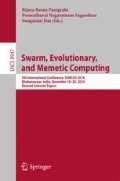Abstract
This paper presents the solution of optimal power flow (OPF) of power system with flexible AC transmission systems (FACTS) devices by using opposition-based gravitational search algorithm (OGSA). OPF problem with FACTS is solved by the way of minimizing an objective function which reflects cost of generation, emission and active power transmission loss. FACTS devices considered include thyristor controlled series capacitor and thyristor controlled phase shifter. The proposed approach has been examined and tested on the IEEE 57-bus test power system. The obtained results are compared with those reported in the literature. Simulation results demonstrate the superiority and accuracy of the proposed algorithm. Considering the quality of the solution obtained, the proposed algorithm seems to be effective and robust to solve the studied problem.
Access this chapter
Tax calculation will be finalised at checkout
Purchases are for personal use only
Abbreviations
- \( N_{G} \) :
-
Number of generators
- \( P_{{_{{G_{i} }} }}^{\hbox{min} } ,\;P_{{_{{G_{i} }} }}^{\hbox{max} } \) :
-
Minimum and maximum active power generation of ith generator, respectively
- \( \delta_{ij} \) :
-
Phase difference of voltages between ith and jth bus
- \( P_{Li} \) :
-
Active power demand of the ith bus
- \( Q_{Gi} ,Q_{Li} \) :
-
Reactive power generation and demand of the ith bus, respectively
- \( P_{TCPS} ,Q_{TCPS} \) :
-
Injected active and reactive powers of TCPS at the ith bus, respectively
- \( N_{B} \) :
-
Number of buses
- \( Y_{ij} \) :
-
Admittance of transmission line connected between the ith and the jth bus
- \( \theta_{ij} \) :
-
Admittance angle of transmission line connected between the ith and the jth bus
- \( N_{TCPS} \) :
-
Number of TCPS devices
- \( N_{TCSC} \) :
-
Number of TCSC devices
- \( X_{{TCSC_{i} }}^{\hbox{min} } ,X_{{TCSC_{i} }}^{\hbox{max} } \) :
-
Minimum and maximum reactance of the ith TCSC, respectively
- \( \phi_{{TCPS_{i} }}^{\hbox{min} } ,\phi_{{TCPS_{i} }}^{\hbox{max} } \) :
-
Minimum and maximum phase shift angle of the ith TCPS respectively
- \( E(P_{G} ) \) :
-
Total emission
- \( \alpha_{i} ,\beta_{i} ,\gamma_{i} ,\eta_{i} \;{\text{and}}\,\lambda_{i} \) :
-
Emission coefficients of ith generator
- \( N_{TL} \) :
-
Number of transmission lines
References
Bouktir, T., Belkacemi, M., Zehar, K.: Optimal power flow using modified gradient method. In: Proceedings International Conference ICEL 2000, vol. 2, pp. 436–442. U.S.T. Oran, Algeria (2000)
Scott, B., Marinho, J.L.: Linear programming for power system network security applications. IEEE Trans. Power App. Syst. 98(3), 837–845 (1979)
Ge, S.Y., Chung, T.S.: Optimal active power flow incorporating power flow control needs in flexible AC transmission systems. IEEE Trans. Power Syst. 14(2), 738–744 (1999)
Ambriz-Perez, H., Acha, E., Fuerte-Esquivel, C.R.: Incorporation of a TCSC firing model for optimal power flow solutions using Newton’s method. Int. J. Elect. Power Energy Syst. 28(2), 77–85 (2006)
Lai, L.L., Ma, J.T.: Power flow control with UPFC using genetic algorithms. In: Proceedings of the International Conference on Intelligent Systems Power System, pp. 373–377 (1996)
Leung, H.C., Chung, T.S.: Optimal power flow with a versatile FACTS controller by genetic algorithm approach. In: Proceedings of the IEEE Power Engineering Society Winter Meeting, pp. 2806–2811 (2000)
Ongsakul, W., Tippayachai, J.: Parallel micro genetic algorithm based on merit order loading solutions for constrained dynamic economic dispatch. Elect. Power Syst. Res. 61(2), 77–88 (2002)
Cai, L.J., Erlich, L.: Optimal choice and allocation of FACTS devices using genetic algorithms. In: Proceedings of the Twelfth Intelligent Systems Application to Power Systems, pp. 1–6 (2003)
Padhy, N.P., Abdel-Moamen, M.A., Kumar, B.J.: Optimal location and initial parameter settings of multiple TCSCs for reactive power planning using genetic algorithms. In: Proceedings of the IEEE Power Engineering Society General Meeting, pp. 1110–1114 (2004)
Ippolito, L., Cortiglia, A.L., Petrocelli, M.: Optimal allocation of FACTS devices by using multi-objective optimal power flow and genetic algorithms. Int. J. Emerg. Elect. Power Syst. 7(2) (2006) Article-1, 2006
Mahdad, B., Srairi, K., Bouktir, T.: Optimal power flow for large-scale power system with shunt FACTS using efficient parallel GA. Int. J. Elect. Power Energy Syst. 32(2), 507–517 (2010)
Saravanan, M.S., Slochanal, M.R., Venkatesh, P., Stephen, J., Abraham, P.: Application of particle swarm optimization technique for optimal location of FACTS devices considering cost of installation and system loadability. Elect. Power Syst. Res. 77(3–4), 276–283 (2007)
Benabid, R., Boudour, M., Abido, M.A.: Optimal location and setting of SVC and TCSC devices using non-dominated sorting particle swarm optimization. Elect. Power Syst. Res. 79(12), 1668–1677 (2009)
Basu, M.: Optimal power flow with FACTS devices using differential evolution. Int. J. Elect. Power Energy Syst. 30(2), 150–156 (2008)
Dai, C., Chen, W., Zhu, Y., Zhang, X.: Seeker optimization algorithm for optimal reactive power dispatch. IEEE Trans. Power Syst. 24(3), 1218–1231 (2009)
Rashedi, E., Nezamabadi-pour, H., Saryazdi, S.: GSA: a gravitational search algorithm. Inf. Sc. 179(13), 2232–2248 (2009)
Tizhoosh, H.R.: Opposition-based learning: a new scheme for machine intelligence. In: Proceedings of the International Conference Computational Intel, Modeling, Control and Automation, pp. 695–701 (2005)
Wang, X.F., Song, Y., Irving, M.: Modern power systems analysis. Springer, New York (2008)
Basu, M.: Multi-objective optimal power flow with FACTS devices. Energy Convers. Manage. 52(2), 903–910 (2011)
Author information
Authors and Affiliations
Corresponding author
Editor information
Editors and Affiliations
Rights and permissions
Copyright information
© 2015 Springer International Publishing Switzerland
About this paper
Cite this paper
Shaw, B., Mukherjee, V., Ghoshal, S.P. (2015). Solution of Optimal Power Flow with FACTS Devices Using Opposition-Based Gravitational Search Algorithm. In: Panigrahi, B., Suganthan, P., Das, S. (eds) Swarm, Evolutionary, and Memetic Computing. SEMCCO 2014. Lecture Notes in Computer Science(), vol 8947. Springer, Cham. https://doi.org/10.1007/978-3-319-20294-5_57
Download citation
DOI: https://doi.org/10.1007/978-3-319-20294-5_57
Published:
Publisher Name: Springer, Cham
Print ISBN: 978-3-319-20293-8
Online ISBN: 978-3-319-20294-5
eBook Packages: Computer ScienceComputer Science (R0)

